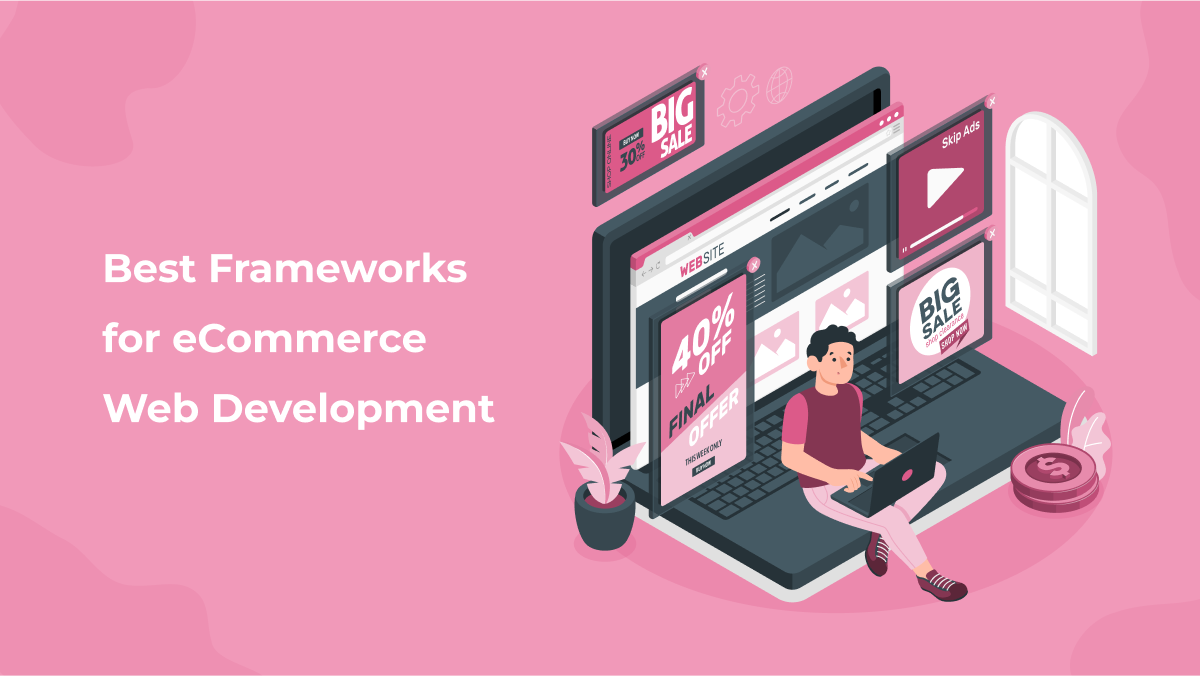Nowadays, eCommerce is a brand-new component of corporate infrastructure that has boosted marketing and consumer acquisition tactics. When building the online store website, especially if eCommerce development is involved, your company plan may need to be altered.
In 2023, e-commerce sales are anticipated to increase by 10.4%. It should come as no surprise that e-commerce sales are anticipated to rise, given that 20.8% of retail purchases are anticipated to be made online in 2023. Your company can sell more products and make more money due to more people shopping online.
One of the most important phases in developing an eCommerce website is selecting a programming framework because it has a significant impact on how well an app functions and performs. Creating a wonderful and acceptable customer experience is a crucial aspect of an eCommerce website.
What is meant by Frameworks for Robust eCommerce Development?
A framework is a group of programs, libraries, and other resources that facilitates software’s quick and simple development.
By avoiding various programming errors, removing repeated code, and repetitious programming, eCommerce frameworks enable developers to execute complicated tasks quickly and effectively while saving time.
Based on a particular programming language, an eCommerce framework excels at particular tasks. Typically, computer specialists are the ones who design and test them. Therefore, if you encounter difficulties, assistance and beneficial counsel are available.
Additionally, choosing the right framework can substantially affect the budget for your eCommerce project, so it’s important to think about both the technical and financial ramifications of your decision.
List of the Prominent eCommerce frameworks
Angular
One of the top JavaScript frameworks powered by Google is known as Angular. Angular has gained more and more traction among users globally because it is open-source and requires less code.
Angular is used by 1,773,176 websites in the United States and 8.4% of the top 1 million websites worldwide.
Due to its outstanding time-saving features like Angular Elements and AngularFire, as well as its variety of useful resources, SEO opportunities, and first-rate community support, which are essential for any eCommerce project, developers favor this eCommerce framework. For speedy shop building and improvement, Angular also provides eCommerce templates.
Laravel
Built on the principles of object-oriented programming (OOP), Laravel is a PHP framework for eCommerce. The model-view-controller (MVC) paradigm is used.
This open-source eCommerce framework offers flexibility by implementing functions that may be modified to fit new classes and rapid debugging due to the self-contained objects.
Additionally, the platform enables quick third-party integration, essential for eCommerce sites that communicate with analytical software, payment processors, and postal delivery providers. Laravel may offer extraordinary site security because of its natural defense against SQL injection and XSS threats.
Vue.JS
The ideas behind Vue were heavily influenced by React and Angular. Vue is one of the best tools for front-end development. This is demonstrated by the fact that there have been over 50 million downloads, and that number is increasing.
You can merge JavaScript code and HTML markup with Vue, an Angular-like framework. When using Vue, the logic, layout, and styles of a component are all stored in the same file. Fantastic and more adaptable than other frameworks is Vue. This framework is more user-friendly than React and Angular and is appropriate for building applications of all sizes.
Vue is one of the top frameworks for developing eCommerce websites. Given Vue’s success in becoming the de facto industry standard among developers globally, the future of eCommerce seems bright.
ReactJS
It is not surprising that React earned many developer votes. React’s ability to integrate logic in front-end projects is strong and simple to use simultaneously. Reusable components, templating systems, interface state synchronization, routing, and other major features are available to users.
A large ecosystem with numerous auxiliary tools and libraries is centered on the React library. The create-react-app command-line tool, the React tools for the Chrome browser, and the React-DOM package are recognized ecosystem elements.React has proven to be one of the best frameworks for building eCommerce websites. Your greatest choice when creating a complex web project for eCommerce will be due to the best React libraries. To create scalable, dynamic, secure, and interactive eCommerce solutions, you can engage ReactJS developers.
Ruby on Rails
An established full-stack eCommerce framework called Ruby on Rails is primarily recognized as a toolkit for the Shopify app. The framework is regarded as cost-effective because it works with free web servers and databases.
Additionally, Ruby on Rails offers a large number of pre-made modules, plugins, and modules that developers can use to save time and start projects more quickly. eCommerce owners don’t have to worry about security because the framework protects against XSS, SQL, and CSRF threats.
Django
Django is a Python eCommerce framework with a large feature set, more than 10,000 packages, and a range of support choices. Programmers can create scalable solutions because of the component-based architecture of the framework, which provides a high degree of part separation.
In addition to offering ready-made code components for crucial activities, Django encourages the creation of reusable applications from similar and interrelated functionality. These features make the framework speedy and effective.
WooCommerce
WooCommece is a popular self-hosted, open-source framework for WordPress websites. WooCommerce, created and maintained by Automattic, includes a respectable initial selection of key checkout functionality for online stores.
You have total flexibility over customization and store management because it’s open source. You may also access a sizable network of WooCommerce Meetup groups to get assistance running your store.
Conclusion
Finding the best eCommerce architecture framework and launching an online business is difficult. We advise doing some research and finding eCommerce websites you like to help you make a decision.
Please pay close attention to their interfaces, speed, designated client path, and payment methods. Find out what technology was used in their development and whether it meets your eCommerce needs. To determine your needs, examine the options and their costs as well. Select the best to create the most beautiful, expanding, and profitable eCommerce solutions for your company.
Meet the Author

Author Name: Harikrishna Kundariya
Biography: Harikrishna Kundariya, a marketer, developer,
IoT, ChatBot & Blockchain savvy, designer, co-founder,
Director of eSparkBiz Technologies. His 12+ years of
experience enables him to provide digital solutions to new
start-ups based on IoT and SaaS applications.

